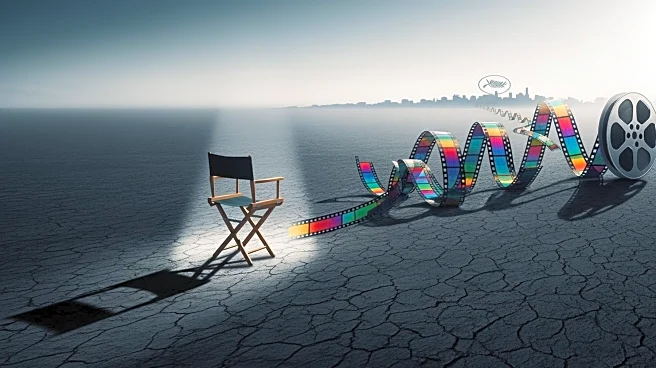What's Happening?
Jafar Panahi, an acclaimed Iranian filmmaker, has faced significant challenges due to the theocratic regime in Iran, including imprisonment and restrictions on his ability to make films. Despite these obstacles, Panahi has continued to produce socially
relevant films that address issues such as the treatment of women, state surveillance, and economic disparities in Iran. His latest film, 'It Was Just an Accident,' won the Palme d'Or at the Cannes Film Festival, marking a significant achievement in his career. The film, a political thriller, explores themes of justice and revenge, and has been selected as France's Oscar entry in the international feature category. Panahi's work has garnered support from notable figures in the film industry, including director Martin Scorsese.
Why It's Important?
Panahi's recognition at Cannes and his continued success in filmmaking highlight the power of art to challenge oppressive regimes and bring attention to social issues. His films provide a voice for marginalized groups and critique the political and social structures in Iran. The international acclaim for Panahi's work underscores the global relevance of his themes and the importance of artistic freedom. This recognition may inspire other filmmakers facing similar challenges to persist in their creative endeavors, despite governmental restrictions.
What's Next?
Panahi's film 'It Was Just an Accident' is set to be released in theaters, potentially reaching a wider audience and sparking discussions on the themes it presents. As France's Oscar entry, the film may gain further international recognition, increasing pressure on Iran's regime to address the issues Panahi highlights. The film industry and human rights organizations may continue to support Panahi, advocating for his freedom and the ability to create without censorship.
Beyond the Headlines
Panahi's journey reflects broader issues of artistic censorship and the role of filmmakers in advocating for social change. His work challenges the boundaries imposed by authoritarian regimes and demonstrates the resilience of artists in the face of adversity. The ethical implications of his films, which often depict the struggles of ordinary people against oppressive systems, resonate with audiences worldwide, fostering empathy and understanding across cultural divides.
















